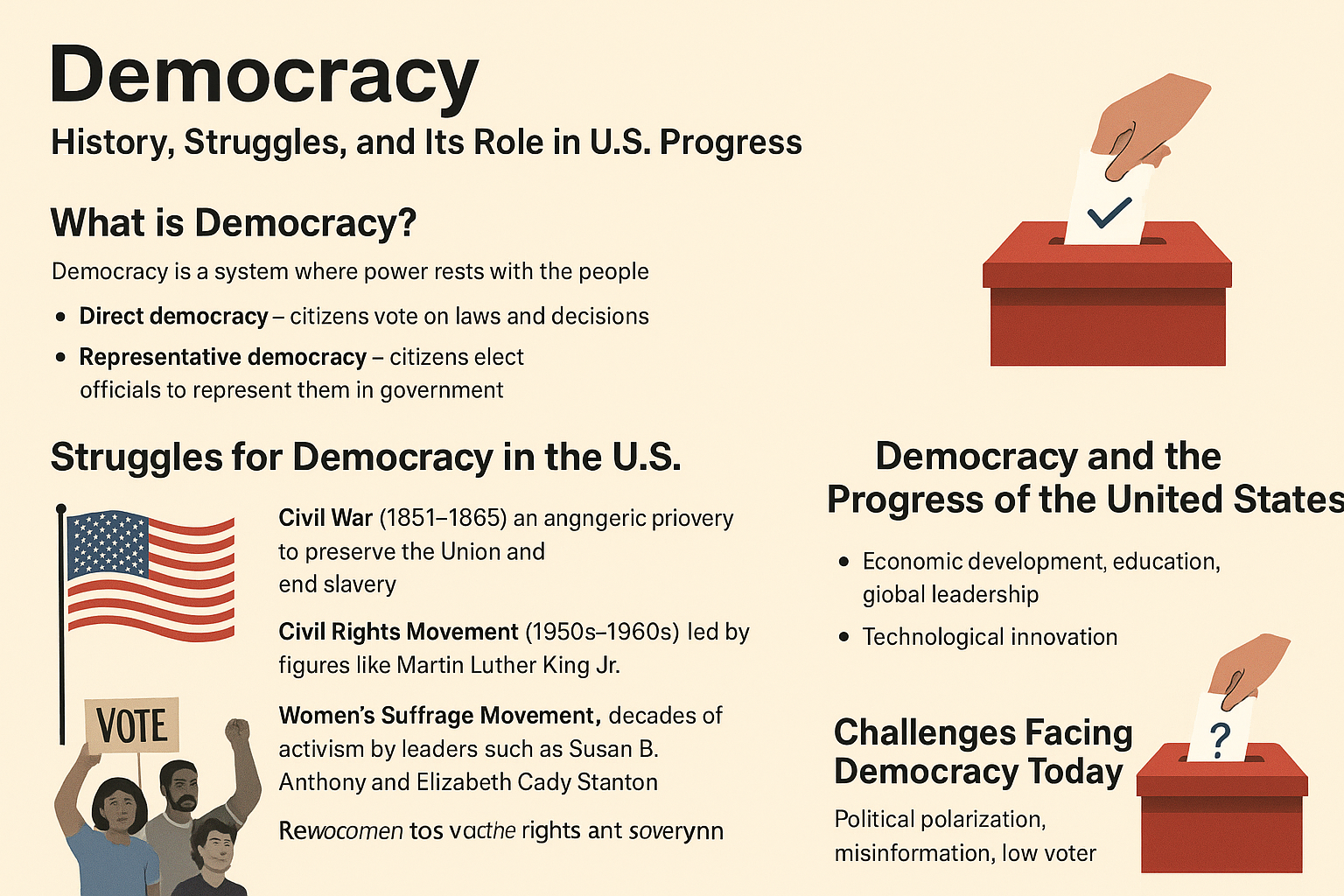Democracy is more than just a political system—it is the foundation of freedom, equality, and collective decision-making. At its core, democracy gives power to the people, allowing citizens to choose their leaders and influence the direction of their country. For the United States, democracy has not only shaped the nation’s identity but also played a central role in its progress.
The story of democracy in the U.S. is one of continuous struggle, expansion, and growth. From the early years of limited voting rights to modern movements for inclusion, the democratic journey reflects resilience and determination. In this article, we’ll look at what democracy truly means, its history, the struggles America faced to preserve it, and how democracy has fueled U.S. progress over the centuries.
What is Democracy?
Democracy is a system of government where power rests with the people. Instead of being ruled by a monarch or a single authority, citizens have the right to vote, debate, and participate in shaping policies. The two main types are:
- Direct Democracy: Citizens vote on laws and decisions directly.
- Representative Democracy: Citizens elect officials to represent them in government decisions.
The United States practices representative democracy, where elected leaders are accountable to the people. It ensures checks and balances, freedom of expression, and equal opportunity for participation.
Historical Roots of Democracy in the U.S.
The foundations of democracy in the United States can be traced back to the Declaration of Independence (1776) and the U.S. Constitution (1787). These documents emphasized liberty, justice, and governance by consent of the governed. However, in its early years, democracy was far from perfect. Voting rights were initially restricted to white male landowners, leaving women, enslaved people, and minorities excluded.
Over time, through amendments and reforms, the U.S. expanded democratic rights. Landmark changes included:
- 15th Amendment (1870): Gave African American men the right to vote.
- 19th Amendment (1920): Granted women the right to vote.
- Voting Rights Act (1965): Protected minorities from discrimination at the ballot box.
These milestones highlight the ongoing struggle to make democracy more inclusive.Read more at: foreignstory.com
Struggles for Democracy in the U.S.
Democracy in the United States has always faced challenges. Civil wars, civil rights movements, and social protests reflect the tension between democratic ideals and reality.
- Civil War (1861–1865): A fight to preserve the Union and end slavery, reinforcing the democratic principle of equality.
- Civil Rights Movement (1950s–1960s): Led by figures like Martin Luther King Jr., it demanded voting rights and equality for African Americans.
- Women’s Suffrage Movement: Decades of activism by leaders like Susan B. Anthony and Elizabeth Cady Stanton resulted in women’s voting rights.
Each struggle strengthened democracy by making it more inclusive and reflective of American values.
Democracy and the Progress of the United States
Democracy has been a driving force behind U.S. growth and innovation. By encouraging participation, debate, and freedom of thought, it created an environment where new ideas flourish. Some key areas where democracy contributed to progress include:
- Economic Development: A system that rewards innovation and protects property rights.
- Education: Public education expanded as a democratic right, empowering generations.
- Global Leadership: U.S. democratic values influenced its role in international affairs, promoting human rights and liberty worldwide.
- Technological Innovation: Freedom of thought and competition in a democratic environment fostered rapid advancements in technology and science.
Internal link idea: Read more about U.S. history and progress on Foreign Story.
Challenges Facing Democracy Today
Even though democracy has advanced greatly, modern America faces new challenges. Issues such as political polarization, misinformation, low voter turnout, and influence of money in politics test the strength of democracy. The resilience of the system depends on active participation and the willingness of citizens to uphold democratic values.
External link idea: According to Pew Research Center, many Americans believe reforms are needed to strengthen democratic processes.
The Human Side of Democracy
Democracy is not only about laws and elections—it is about people. It represents the struggles of families who fought for equality, the voices of communities demanding fair treatment, and the dreams of individuals who believe in freedom. Democracy in the U.S. remains a living story, evolving with each generation.
Frequently Asked Questions (FAQ)
What is the main idea of democracy?
The main idea of democracy is that power belongs to the people, giving them a voice in decision-making through voting and representation.
When did democracy start in the United States?
Democracy began with the Declaration of Independence in 1776 and was formalized with the U.S. Constitution in 1787.
Why was the Voting Rights Act of 1965 important?
It was a landmark law that ended discriminatory practices like literacy tests, ensuring equal access to the ballot for minorities.
How does democracy help the progress of a nation?
Democracy allows diverse voices to be heard, encourages innovation, ensures accountability, and protects freedoms that support growth.
What challenges does U.S. democracy face today?
Key challenges include political division, misinformation, and declining trust in institutions.
Conclusion
Democracy is the heartbeat of the United States. Its history is filled with struggles, victories, and constant evolution. From the birth of the nation to modern times, democracy has shaped U.S. progress, allowing it to grow into a global leader. While challenges remain, the strength of democracy lies in the active participation of its people.
As citizens continue to value freedom, equality, and justice, democracy will remain the foundation of America’s identity and future.
